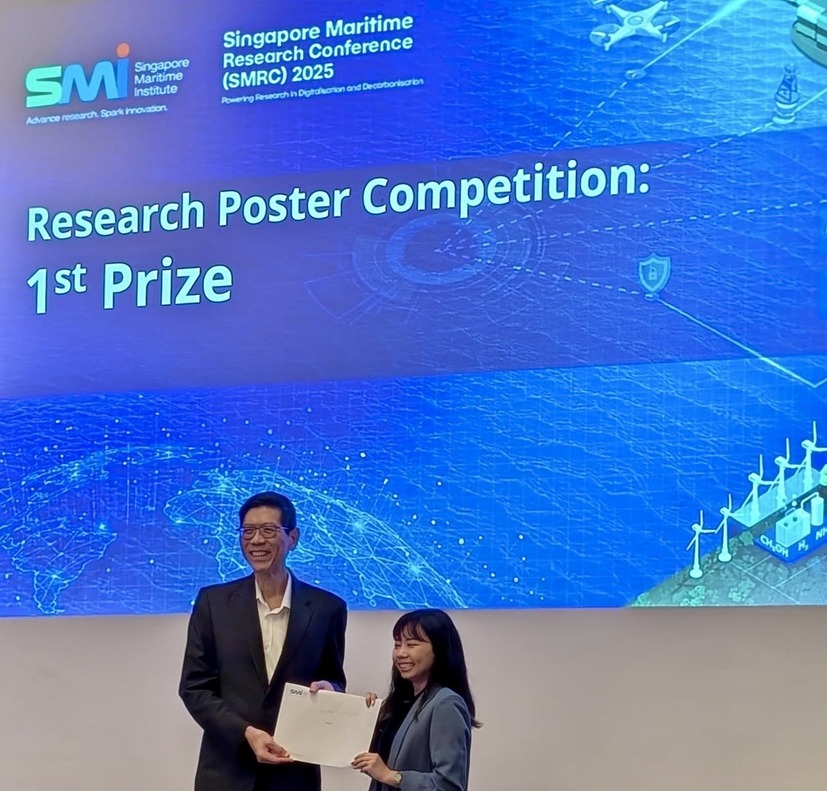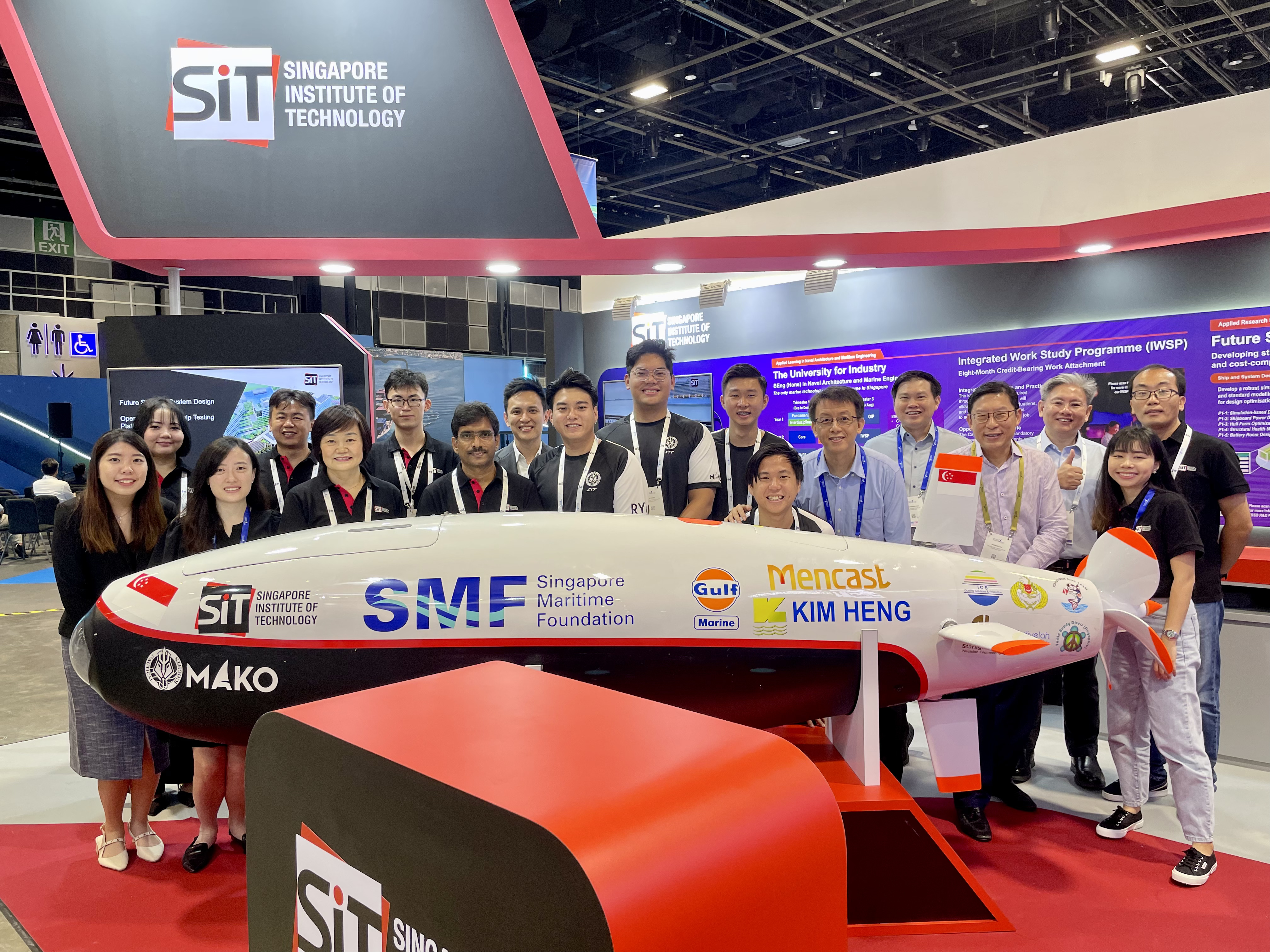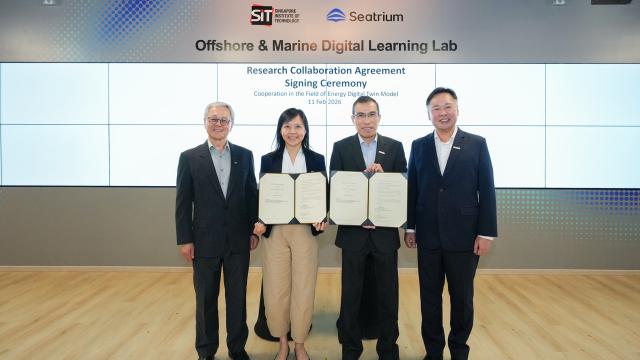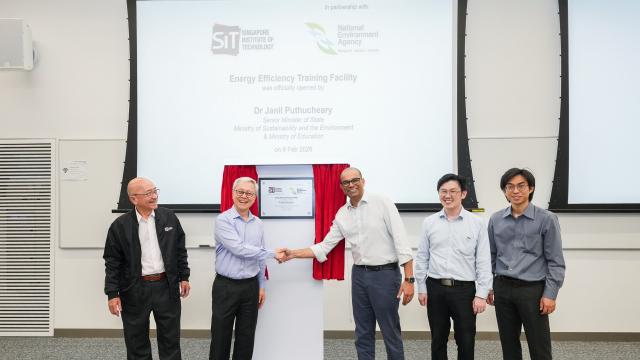SIT doctoral candidate Ong Wen Qi is powering battery research for the next generation of electric harbour crafts.

Ong Wen Qi (right) received the top prize and most popular poster award at the Singapore Maritime Research Conference 2025 for her project, “Fire Resilient Battery Room Design for Next-Gen Electric Harbour Crafts,” which proposes safer battery room standards and emergency response frameworks to mitigate fire risks on electric vessels. (Photo: Ong Wen Qi)
Under the Maritime Singapore Decarbonisation Blueprint, all harbour crafts will operate on low-carbon energy solutions by 2030 and full electric propulsion and net-zero fuels by 2050. The aim is to achieve a 15% reduction in absolute emissions from 2021 levels by 2030 and a 50% reduction from 2030 levels by 2050.
While this shift marks a significant stride toward maritime decarbonisation, it also presents a sea of challenges, from ship safety and charging infrastructure to port readiness.
Many maritime professionals are working hard to meet the target, including Ong Wen Qi, who is taking the Doctor of Engineering programme at the Singapore Institute of Technology (SIT). She is addressing a critical issue related to fire safety in battery rooms of full-electric harbour crafts (e-HCs).
Applied Research with Real-World Impact

Wen Qi (1st row, extreme right) with her colleagues at the Singapore Maritime Week in March 2025. (Photo: Ong Wen Qi)
Wen Qi knew she wanted to contribute to decarbonising the maritime industry. She just needed to decide where to focus her research.
“Decarbonisation efforts can happen at different levels – from government agencies setting policies, to engineers and companies developing the actual technologies,” she said. “I wanted to focus on where the technology is being applied, where real solutions are needed on the ground.”
In 2023, after being onboard an e-HC, she found herself intrigued by the technologies behind the harbour craft. But after doing some research, she discovered a glaring problem – the batteries that powered the e-HCs posed a risk to safe ship operations.
Thermal runaway in batteries is a dangerous and self-perpetuating process that causes batteries to overheat uncontrollably, she explained. A thermal runaway event at sea can be life-threatening and disruptive to the busy shipping lanes in the Port of Singapore.
“Fire safety of battery rooms is a major concern in the marine environment,” said Wen Qi, who is pursuing her research under SIT’s Industrial Doctorate research-based programme.
Her proposed research addresses the fire risks associated with lithium-ion batteries through a two-step approach. First, she observed that the eHCs have different battery room designs with different fire mitigation and safety philosophies, which require considerable effort to evaluate in terms of operations, safety and emergency response. To address these challenges, her research proposes an evaluation framework for battery room design that industry stakeholders can reference and adopt.
Second, building on this framework, she plans to develop a guide for emergency response for fire safety personnel that will inform protocols for extinguishing battery fires and safely navigating the e-HC during an emergency.
Her project, “Fire Resilient Battery Room Design for Next-Gen Electric Harbour Crafts”, focuses on refining a simulation model to test and validate these safety strategies. She credits the invaluable guidance of her project supervisor, Associate Professor An Hui, for deepening her understanding of simulation processes throughout this process.
The impact and relevance of this project were recognised at the Singapore Maritime Research Conference 2025, where Wen Qi was awarded the first prize and most popular poster among 35 entries. This award reflects her technical excellence and ability to communicate complex ideas with clarity.
Curiosity Sparked by Ships, Fuelled by Purpose
Wen Qi and A/Prof An Hui (2nd and 3rd from left respectively in the first row in the background) with her colleagues at the Future Ship & System Design Lab at SIT Punggol Campus. (Photo: Ong Wen Qi)
Wen Qi’s passion for the maritime industry began in childhood. Her father, a container truck driver, often took her on drives around Changi and the East Coast, pointing out ships along the port.
“I always wondered how one ship could carry so many containers,” she recalled. After secondary school, she dove head-first into the maritime field by pursuing a diploma in Marine Engineering at Singapore Polytechnic.
She later earned a degree in Naval Architecture and Marine Engineering from SIT, graduating as part of the pioneer cohort in the programme. Following several years in the industry, she decided to deepen her expertise by enrolling in SIT’s Doctor of Engineering programme in 2024.
“I earned my bachelor’s degree at SIT, and many of the faculty who taught me then are still here. They equipped me with the right skill set and mindset,” she said. “A doctorate is a very niche but challenging pathway, and I knew the professors would provide me with the support I needed.”
Now a research engineer at SIT, Wen Qi balances her time between research meetings and classes. “It’s challenging, but also very rewarding,” she laughed.
With the maritime industry rapidly evolving and technologies advancing, she’s eager to contribute meaningfully.
With five years to go in her PhD journey, Wen Qi is wasting no time as she steers full steam ahead on her mission to make maritime decarbonisation safer and smarter.















![[FA] SIT One SITizen Alumni Initiative_Web banner_1244px x 688px.jpg](/openhouse2025/openhouse/directory/sites/default/files/2024-12/%5BFA%5D%20%20SIT%20One%20SITizen%20Alumni%20Initiative_Web%20banner_1244px%20x%20688px.jpg)


